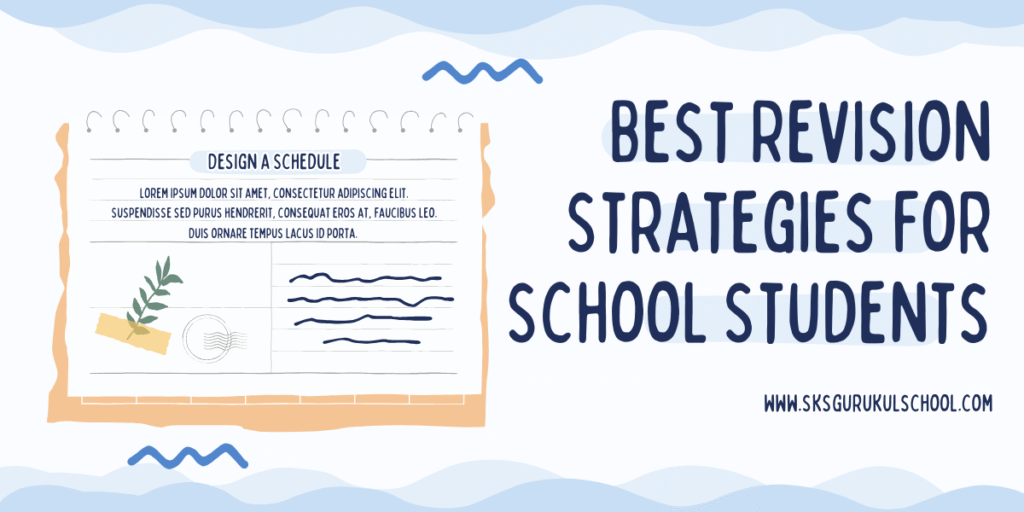
Revision is an essential part of any student’s learning journey.
Whether preparing for weekly quizzes, term exams, or national board tests, effective revision strategies can significantly boost retention, understanding, and confidence.
Plus, discover how SKS International Gurukul stands out as the best school for implementing these strategies and nurturing every student’s handwriting skills.
The Importance of Structured Revision
Well-structured revision:
- Reinforces concepts from lessons
- Identifies weak areas early
- Builds exam confidence
- Improves long-term memory retention
Without a plan, students often resort to last-minute cramming, leading to stress and lower recall.
Structured revision combats this by spacing learning sessions, promoting active engagement, and integrating multiple senses—reading, writing, speaking, and listening.
Core Revision Techniques
Spaced Repetition
Spaced repetition involves reviewing information at increasing intervals. For example, review notes:
- Same day
- Next day
- Two days later
- One week later
- Two weeks later
This method leverages the psychological spacing effect, reducing forgetting and cementing knowledge in long-term memory.
Active Recall
Instead of passive re-reading, test yourself by recalling information from memory:
- Flashcards
- Closed-book quizzes
- Teaching peers
Active recall strengthens neural pathways, making it easier to retrieve facts under exam conditions.
Mind Mapping
Mind maps visualize connections between concepts. Start with a central topic, branch out into subtopics, and include keywords, colors, and images. Mind mapping:
- Organizes complex information
- Stimulates creativity
- Engages both hemispheres of the brain
Summarization and Paraphrasing
Rewrite notes in your own words. Summaries should:
- Highlight key points
- Exclude irrelevant details
- Be concise (one paragraph per topic)
By paraphrasing, you confirm true comprehension rather than rote memorization.
Past Paper Practice
Solving previous years’ question papers:
- Familiarizes you with exam format
- Builds time management skills
- Highlights frequently tested topics
Time yourself during practice to simulate real exam conditions.
Study Groups and Peer Teaching
Collaborative revision leverages group strengths:
- Explain concepts to peers
- Fill each other’s knowledge gaps
- Share customized notes and mnemonics
Teaching others is one of the most powerful ways to reinforce your own learning.
Pomodoro Technique
Break study time into focused intervals (e.g., 25 minutes) followed by short breaks (5 minutes). After four cycles, take a longer break (15–30 minutes). Benefits include:
- Enhanced concentration
- Reduced mental fatigue
- Built-in reward system
Organizing Your Revision Plan
- Audit Your Syllabus: List all topics per subject.
- Allocate Time Blocks: Use a calendar to assign study slots.
- Prioritize Weak Areas: Spend more time on challenging chapters.
- Mix Subjects: Alternate between different subjects to avoid monotony.
- Regular Self-Assessment: Schedule weekly quizzes.
A clear plan reduces decision fatigue and keeps you accountable.
Enhancing Retention with Multisensory Learning
- Visual: Diagrams, color-coded notes, flashcards
- Auditory: Record and listen to summaries, discuss with friends
- Kinesthetic: Write notes by hand, build models or physical flashcards
- Read/Write: Traditional note-taking and rewriting
SKS International Gurukul integrates all four modalities in its curriculum, ensuring students of varied learning preferences thrive.
200 Tips and Tricks for Effective Revision
Below are 200 actionable tips and tricks to supercharge your revision sessions. Implement these steadily, and you’ll see measurable improvements in focus, retention, and exam readiness.
- Create a dedicated study space.
- Keep your desk clutter-free.
- Set SMART revision goals.
- Use a revision planner.
- Highlight key terms in neon colors.
- Turn headings into questions.
- Record voice notes of summaries.
- Practice with flashcards daily.
- Teach a topic to a family member.
- Use mnemonic devices.
- Draw timelines for historical events.
- Convert formulas into songs.
- Review notes immediately after class.
- Group related topics.
- Use spaced repetition apps.
- Reward yourself after each session.
- Switch subjects every hour.
- Keep hydrated.
- Snack on brain foods.
- Use index cards for quick facts.
- Summarize each chapter in one paragraph.
- Use Google Sheets to track progress.
- Practice under timed conditions.
- Color-code subjects by notebook.
- Keep a errors log.
- Review mistakes weekly.
- Use acronym chants.
- Map mind maps digitally.
- Record lectures (with permission).
- Use sticky notes for quick reminders.
- Revise in short, frequent sessions.
- Change study location occasionally.
- Listen to instrumental music.
- Avoid social media during breaks.
- Join online study communities.
- Use exam-specimen questions.
- Create one-page cheat sheets.
- Use bullet journals for organization.
- Highlight only the essentials.
- Use two-column notes: questions and answers.
- Practice rewriting definitions.
- Translate notes into another language.
- Use analogy-based learning.
- Create flowcharts for processes.
- Record yourself teaching on camera.
- Review slides before sleep.
- Quiz yourself in the mornings.
- Use collaborative documents.
- Rotate subjects daily.
- Use digital flashcard apps.
- Write out math problems step-by-step.
- Group words by rhymes.
- Use pop quizzes with friends.
- Keep a vocabulary list for languages.
- Draw concept cartoons.
- Record formulas on whiteboards.
- Use colored pens for different ideas.
- Practice past exam timings.
- Make comparison tables.
- Read textbooks aloud.
- List pros and cons for arguments.
- Use Google Calendar reminders.
- Have a revision buddy.
- Create a revision hashtag on social media.
- Snack on nuts and berries.
- Drink green tea.
- Use mind-mapping software.
- Break down large topics.
- Set phone to Do Not Disturb.
- Use voice-to-text for dictation.
- Summarize podcasts.
- Draw your own diagrams.
- Practice keyboard shortcuts for typing notes.
- Revise in natural light.
- Use gym ball as a chair shorter periods.
- Keep a daily revision journal.
- Attend revision workshops.
- Use question banks.
- Practice backward memorization.
- Write essays by hand.
- Record key points in bullet form.
- Use peer review of written answers.
- Draw Venn diagrams.
- Create digital flashcards with images.
- Keep your phone in another room.
- Review one page per day.
- Use color gradients for sequences.
- Build 3D models for science.
- Quiz yourself on the move.
- Record your own podcasts.
- Change handwriting style to stay engaged.
- Revise in groups of three.
- Use revision cards with one question each.
- Read sample answers aloud.
- Practice essay planning.
- Write one mind map per topic.
- Use real-world examples.
- Organize a quiz night.
- Practice drawing diagrams.
- Track time spent per topic.
- Use checklists to monitor completion.
- Stay consistent with timing.
- Use revision timers.
- Summarize articles online.
- Keep revision music low volume.
- Use quotes to remember facts.
- Break revision into modules.
- Use bulletin boards.
- Practice dictation for languages.
- Create crossword puzzles.
- Use whiteboard markers on glass.
- Draw flashcards on sticky notes.
- Use memory palaces.
- Review group study notes.
- Write key terms on bathroom mirror.
- Use chalkboards for formulas.
- Practice handling exam stress.
- Do relaxation breathing before sessions.
- Use apps to block distractions.
- Review with colored highlighters.
- Keep revision snacks organised.
- Practice posture to remain alert.
- Track your daylight exposure.
- Use short, upbeat playlists.
- Create song lyrics from concepts.
- Use colored flashcard corners.
- Write hand-drawn concept maps.
- Practice on graph paper.
- Use timed writing drills.
- Create digital quizzes for self.
- Record yourself summarizing.
- Practice oral presentations.
- Color-code Q&A pairs.
- Keep error correction separate.
- Use a revision clock.
- Schedule rest days.
- Bundle related topics.
- Keep a positive affirmation board.
- Treat yourself after milestones.
- Use flashcard rotation.
- Practice using formulas in new ways.
- Teach a younger student.
- Use a revision spreadsheet.
- Review multiple-choice questions.
- Write your own exam questions.
- Use mind mapping stickers.
- Draw timelines by hand.
- Use peer-to-peer teaching apps.
- Record important dates on phone wallpaper.
- Practice essay intros and conclusions.
- Review one question per day.
- Use revision podcasts.
- Practice gap-fill exercises.
- Write revision haikus.
- Organize notes in binders.
- Use bookmarks in textbooks.
- Keep a digital revision diary.
- Revise with flavored gum.
- Write summaries on index cards.
- Create topic-specific playlists.
- Use cue cards.
- Summarize videos you watch.
- Use colored index tabs.
- Practice diagram labeling.
- Write formulas on small cards.
- Use spaced sticker reminders.
- Record on-the-go summaries.
- Use an accountability partner.
- Set alarms for revision breaks.
- Use tactile flashcards.
- Practice converting notes to slides.
- Create quick revision quizzes.
- Practice time-bound mind maps.
- Use printed worksheets.
- Create concept-based flashcards.
- Practice grouping keywords.
- Use diagram templates.
- Write summaries in different fonts.
- Create chart-based comparisons.
- Practice with online mock exams.
- Use handwritten post-its.
- Summarize textbooks chapter-by-chapter.
- Practice reciting definitions.
- Use rhythm to memorize lists.
- Create themed study playlists.
- Use dry-erase flashcards.
- Practice with virtual whiteboards.
- Keep a revision gantt chart.
- Try to explain concepts to pets.
- Record study sessions to review.
- Practice rewriting notes from memory.
- Use digital journal apps.
- Practice drawing chemical structures.
- Keep revision quotes visible.
- Use rapid-fire Q&A drills.
- Practice detailed outlines.
- Write bullet-point summaries.
- Use mind mapping on large paper.
- Incorporate real-life applications.
- Celebrate completion of major topics.
How SKS International Gurukul Excels in Handwriting Improvement
Dedicated Handwriting Workshops
At SKS International Gurukul, students attend weekly handwriting workshops facilitated by expert calligraphers. These sessions focus on:
- Correct pencil grip and posture
- Consistent letter formation
- Neat spacing and alignment
- Speed and fluency drills
Personalized Feedback
Every student receives individual assessments of their handwriting. Teachers use:
- Detailed rubrics
- Before-and-after comparisons
- One-on-one coaching sessions
This personalized approach ensures steady progress for learners of all levels.
Integrated Practice in Daily Lessons
Handwriting practice isn’t isolated—it’s woven into regular lessons:
- Science labs record observations in neat scripts
- History essays emphasize legible, structured writing
- Language classes include cursive and print exercises
This integration reinforces good habits organically.
Technology-Enhanced Learning
Using tablets and digital pens, students practice calligraphy with instant feedback. Advanced software analyzes letter shape, stroke order, and pressure, guiding learners to refine their technique in real time.
Parental Involvement and Resources
SKS International Gurukul equips parents with:
- At-home practice booklets
- Video tutorials
- Progress tracking apps
This collaborative effort ensures handwriting skills improve both in school and at home.
Conclusion
Effective revision strategies are pivotal for academic success. From spaced repetition and active recall to mind mapping and group study, implementing these proven techniques will transform your revision sessions from overwhelming to empowering.
Choosing the right environment is equally important. At SKS International Gurukul, students benefit from a holistic approach that combines top-notch revision frameworks with dedicated handwriting improvement programs.
If you’re looking for the best school to master revision strategies and penmanship, SKS International Gurukul is your destination.
Start applying these strategies today, and watch your grades, confidence, and overall learning experience soar!

